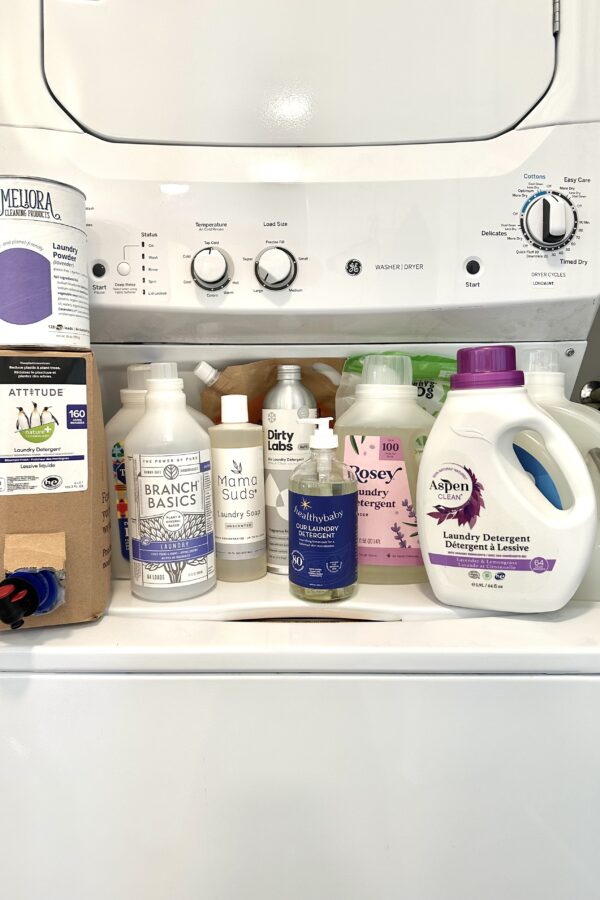We’ve talked about a lot of different popular fragrance brands here at The Filtery, from Bath & Body Works and Yankee Candle, to Glade and Downy, and more.
And now we’re investigating yet another popular brand: Air Wick. Is Air Wick’s collection of air fresheners bad for you? Let’s find out.
Table of Contents
- Digging Into Air Wick Ingredients
- Are Air Wick Plug-In Air Fresheners, Sprays, and Other Products Toxic?
- Is Air Wick Toxic for Dogs, Cats, or Other Animals?
- Is Air Wick Greenwashing?
- Are Air Wick Plug-Ins a Fire Hazard? Can You Leave Them Plugged In?
- Better Non-Toxic Alternatives
- Conclusion: Can Air Wick Make You or Your Pets Sick?
Digging Into Air Wick Ingredients
Air Wick’s website doesn’t disclose the ingredients in their air fresheners (just like Glade, they’re going to make us dig for it!).
But when we head over to the brand’s parent company, Reckitt, we can find some more info. (Reckitt also owns a number of other popular household brands like Lysol, Woolite, Mucinex, and more.)
Air Wick’s plug-in air fresheners essentially just include “one” ingredient: fragrance. As we’ve discussed frequently on The Filtery, the word “fragrance” (or “parfum” or “eau de toilette”) presents a big problem for conscious consumers because of what many call the “fragrance loophole.” This loophole allows companies to include roughly 4,000 different chemicals (and that number keeps getting bigger) in their products while hiding them under that one word: “fragrance.” Some of these ingredients are completely safe, while others are known toxins. You can read more about this fragrance loophole problem here.
We’re starting to make progress in this area, though. With an increase in consumer demand for transparency and safety, along with a couple of new California laws about ingredient disclosure, many brands are beginning at least make their ingredients available for customers to find. This is why Air Wick’s parent company, Reckitt, now lists Air Wick’s fragrance ingredients on their website.
Are Air Wick Plug-In Air Fresheners, Sprays, and Other Products Toxic?
When we start digging into the actual ingredients in Air Wick’s plug-ins, sprays, candles, and more, we see some pros and cons…
THE PROS
- At least the actual ingredients are available somewhere… even if you have to dig for them!
- The specific fragrance ingredients that are included on one of what Reckitt calls a “Designated List” (which includes California’s Prop 65 list, the E.U. list of known allergens, the IRAC’s list of carcinogens, and many more) are indicated with a “DL” label next to them. This makes it easier for consumers to identify which ingredients could possibly be problematic.
- Air Wick’s plug-in scented oils do not contain many of the common toxins that similar conventional brands do (like xylene, styrene, benzene, parabens, phthalates, and others).
THE CONS
- The ingredients are not readily available on the Air Wick product packaging or brand website. When it comes to user experience, they get an F from us.
- Many of Air Wick’s products contain a number of ethoxylated ingredients. These ingredients go through a process that uses two toxic ingredients: ethylene oxide (a carcinogen and suspected endocrine disruptor) and 1,4-dioxane (a carcinogen). The end products have been found to be contaminated with those two ingredients.
- Most of their sprays contain VOCs like butane, propane, and more.
- Air Wick’s candles are made with paraffin wax, which is a petroleum product. You can read more about that here.
- Some of their products contain methylchloroisothiazolinone and methylisothiazolinone. These are irritants and they’re banned in other places of the world, like Canada and Japan.
- Their products also contain a laundry list of other synthetic ingredients that are either suspected toxins or understudied chemicals (a.k.a. we really don’t know yet if they’re safe or not).
Do Air Wick Plug-Ins Have Phthalates?
This is a tricky one. We weren’t able to find any phthalates on any of the plug-in ingredient lists that we investigated, which is a good thing! However, we also weren’t able to find anything from Air Wick or Reckitt that says they don’t use phthalates either.

Is Air Wick Toxic for Dogs, Cats, or Other Animals?
Because fo the info above, we know that Air Wick’s fragrance products are not healthy for most living things, furry or not. But pet owners should be extra careful when it comes to scented products because animals are especially sensitive to certain plants and oils that are safe for humans. This includes:
- Cinnamon
- Citrus
- Peppermint
- Pine
- Sweet Birch
- Ylang Ylang
- Anise
- Yarrow
- Juniper
- Clove
- Thyme
You should be most concerned about your pet actually eating these types of oils, so be sure to keep these products where your pet is not likely to lick them.
When it comes to spraying or diffusing these oils into the air, it’s more of a grey area. Unfortunately, there isn’t any real research on whether or not these oils are safe for pets to inhale in small amounts, so you should use them at your discretion and/or ask your vet to be sure.
Is Air Wick Greenwashing?
When researching Air Wick’s various products, we couldn’t help but notice that a lot of them include phrases like “nature-inspired,” “infused with natural essential oils,” “planet conscious,” and “propelled with 100% filtered air” (what does that even mean?). They even have a line of automatic air freshener sprays that has the large word “PURE” across the front of it.
As the consumer demand for non-toxic, eco-friendly, and sustainable products increases, we see more and more conventional brands using this type of jargon as a marketing tactic. It is not only confusing and misleading to customers, but it’s borderline lying (which they’re able to do because so much of the industry is so unregulated).
You can decide for yourself if you think this is considered greenwashing or not!
Home
7 Febreze Alternatives! Non-Toxic Air Fresheners & Organic Room Sprays (2024)
Everyone loves a fresh-smelling home, car, gym bag, and bathroom. Here are the best organic and non-toxic air freshener sprays to use instead of Febreze!
Are Air Wick Plug-Ins a Fire Hazard? Can You Leave Them Plugged In?
Just like with other plug-in air fresheners, Air Wick is not likely to be a fire hazard if you leave it plugged in for a long period of time. Just make sure you’re using it properly and that there isn’t anything faulty going on with the wiring in your home or office building where you’re using the plug-ins.
Better Non-Toxic Alternatives
If you’re looking for better alternatives to Air Wick’s products, we’ve got you covered. You can click here for our favorite plug-in air fresheners and here for healthier candles.
Conclusion: Can Air Wick Make You or Your Pets Sick?
While we’re glad to see an increase in transparency from these big brands like Air Wick, we cannot consider their plug-in scented oils, room sprays, or other fragrance products non-toxic. Unfortunately, they contain several known carcinogens, allergens, irritants, and other harmful chemicals.






For a couple of days I had the Air Wick lavender by my husband’s bedside to help him sleep…It seemed to work. Then I read about the safety warnings and how reluctant and sneaky the company is by not disclosing everything concerning how safe it is to inhale. Unless the company is 100% transparent, I will never use it again (Even though it is relaxing). Why would an honorable company put toxins in a product that is designed to be inhaled? DISGUSTING!!
I inquired to Air Wick about their plug-in infused with natural oils product 18008880192 for information about where their scents were manufactured. They couldn’t tell me. Their answer was “it could be made anywhere in one of our factories worldwide”.
Not a satisfactory answer so I will be returning the product yo Costco where I bought it.
An Air Wick plug in was included as an extra from Walgreens and it gave me no trouble. Last Sunday I purchased several with a different fragrance (White Linen) and plugged them in at top spray in two places. By bedtime I felt shivery cold and was running a rather low grade fever. Now we are into Tuesday and the fever persists. I also have other respiratory symptoms in my bronchial tubes. I have not been ill from anything for 20 years and am puzzled how this could happen. I rarely go anywhere and always wear a mask (KN95). These came via a no contact food delivery. This article gave me a clue and I will unplug them right away.
Using this product in the past made me very Ill, sitting by it in my work space every day after a while I was unaware why I was feeling nauseous and eventually unable to make it up my own stairs when it died out I didn’t even realize that it was the cause till I finally purchased a new one and started feeling sick all over again I vowed never to purchase another… however I recently visited my daughter and her house smelled so nice but only for a moment then something started making me feel Ill which triggered a bad memory of that feeling, looking around I noticed that plug-in, I reminded her how bad I felt in the past and she Quickly unplugged all 3, I was sick still when I woke the next day and after leaving felt much better 🤦🏻♀️
So sorry to hear about your experience, Jacque, but glad to know you were able to identify the problem!
I had a air wick plug in leak onto a piece of furniture
and it stripped the finish off of the wood. If it does this to
furniture, what is it doing to our lungs
This is great research. We need more people doing it, and more people reading it! It’s helping me with my own research.
My take away is that these types of products turn off receptors, whether it be the cilia in our nasal passages, olfactory bulbs, and they can even turn off cell apoptosis, programmed cell death, which if turned off can lead to cancer. By putting our sensors to sleep, we have the convenience of no longer having to smell a ‘nasty’ smell, but it throws off our intuitive faculties.